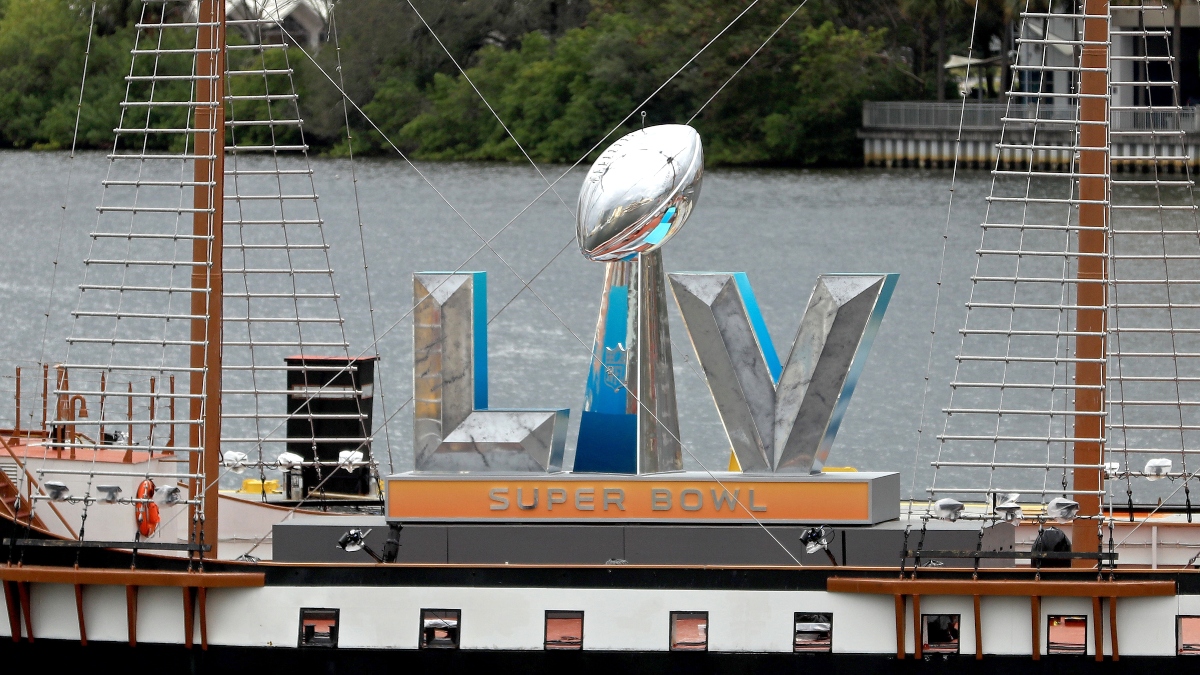Super Bowl Showcases Opportunities for Further Sports Betting Legalization
Getty Images. Pictured: Super Bowl 55 logo
A record 20 states plus Washington D.C. will take legal sports bets this upcoming Super Bowl Sunday, all but assuring it will see the highest single-day handle in regulated U.S. betting history.
Gaming industry officials believe the legal market will make up a growing share of the $4.3 billion projected to be bet on Super Bowl LV and the game could be a catalyst for more legal markets to follow in time for Super Bowl LVI.
Speaking with the Action Network Thursday, SVP and Head of U.S. at 888 Holdings Yaniv Sherman said the proliferation of more and more states, plus the precarious financial situation in statehouses nationwide, gives more momentum than ever to gaming legalization efforts.
“FOMO is a formidable force,” Sherman said.
Super Bowl Highlights Legal Betting
For just the third time since the Supreme Court struck down the federal wagering ban, U.S. bettors will be able to place a legal Super Bowl wager outside Nevada. The American Gaming Association estimates more than 23 million Americans will bet on this year’s Super Bowl, but that less than 2 million will do so through a bookie, a 21 percent decline from last year.
This decline can, in part, be explained with expanded legal betting options. The same AGA survey also found 65 percent of expected Super Bowl bettors believe it's important to use a legal sportsbook, an uptick from the organization’s previous research.
This in turn has helped state lawmakers warm to regulated sports betting, a move that seemed taboo across much of the country just a few years ago.
Sherman said political concerns and risk management issues helped derail sports betting legislation in prior years. As more and more states roll out safe, regulated markets, Sherman said elected officials are increasingly comfortable with legal wagering in their state.
“I think that by now everybody understands that there is no real product risk here,” Sherman said. “If we continue pushing responsible gaming, this will also alleviate the concerns about accessibility of the product,” Sherman said.
State tax revenues are another major incentive, Sherman said.
“The fact is that this money, if it's not going to a regulated market, is going offshore, and that’s just an enormous waste of public funds.”
Expansion Brings Additional Challenges
That doesn’t mean sports betting’s rapid growth has come with obstacles or future challenges.
Top U.S. sportsbooks have spent millions attracting new customers in the past three years, raising concerns the increased marketing exposure could lead to further regulations, like after the daily fantasy boom of 2015. This will reach a new high-water mark Sunday when legal sportsbooks are expected to spend millions more for Super Bowl ads.
With many traditional Super Bowl advertisers skipping this years’ game, these sportsbook ads could gain even more prominence. This must be tapered, Sherman said, with the potential for greater regulatory crackdowns if marketing becomes too intrusive.
“I think we need, as an industry, to present some self-regulation and restraint and not necessarily be so much ‘in your face’,” Sherman said. “I know it's almost counter-intuitive, but you don't want to end up digging your own grave by creating the wrong type of exposure.”
Sherman said this puts more emphasis than ever on the legal sportsbooks to strengthen their player protections and responsible gaming measures. These protections can actually be an incentive for new players, Sherman said, because they are not offered by unregulated bookmakers or offshore sites.
The player protections will help the legal market attract new players and build long-term success, Sherman said. An advertising blitz can attract new customers in the short term, but unregulated sportsbooks will increase political and regulatory scrutiny in the long term.
“I don't want to harvest near-term gains if someone now perceives me as a menace,” Sherman said.
Future Plans in Existing Markets
If expansion plans from 888 and most other top sportsbooks are any indicator, these are challenges they are happy to take on.
By Super Bowl LVI, 888 plans to launch new products in Pennsylvania, Iowa, Indiana and Colorado, Sherman said. They will have plenty of competition.
Penn National CEO Jay Snowden said during his company’s quarterly earnings call Thursday that its Barstool Sportsbook plans to launch in Illinois by March and as many as seven additional states by the end of 2021.
Expansions from these companies come as market leaders DraftKings and FanDuel, building off their DFS market blitz more than five years ago, are already in nearly a dozen states. Other established U.S. brands such as BetMGM and Ceases, which recently acquired U.K. operator William Hill, are also rapidly expanding in new sports betting states, as too are foreign brands such as PointsBet and Unibet.
More States Consider Legal Betting
Roughly two-dozen sportsbook brands already operate in at least one U.S. jurisdiction. More are set to follow.
Along with the 21 jurisdictions already taking bets, North Carolina, Washington, Louisiana, Maryland and South Dakota could all do so by the end of 2021. More than a dozen additional states, including Arizona, Connecticut, Georgia, Missouri, Kansas and Massachusetts have already introduced online sports betting legislation this year.
Sherman said changing political attitudes and lingering budget concerns could expedite expanded online poker, casino gaming and, in particular, sports betting. He said as many as 40 states could legalize sports betting by 2023 or 2024, especially if high-population states such as California, Texas and Florida do so as well.
Excluding a few holdouts such as Utah and Alaska, Sherman said future Super Bowls could see near nationwide access to legal betting.
“Other than (a few exceptions), I don't see a single state that shouldn't be considering this going forward,” Sherman said.
How would you rate this article?


